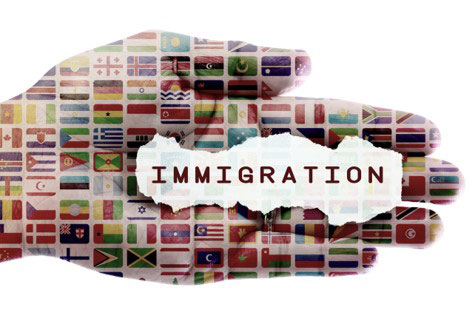
Understanding Immigration ” Enriching Lives, Uniting Cultures”
Understanding Immigration Visas: A Comprehensive Guide

Immigration is a topic of significant importance and interest worldwide. One of the key elements facilitating immigration is the visa system. This blog aims to provide a comprehensive understanding of immigration visas, their types, processes, and the impact they have on individuals and nations.
Immigration is more than a journey across borders; it's a testament to human resilience, ambition, and the desire for a better life. The topic of immigration often stirs intense debate, but it's crucial to remember the profound impact it has on enriching lives and uniting cultures. Let's explore how immigration shapes our world in ways that are both transformative and beneficial.
Enriching Lives
Immigrants often leave behind their homes, families, and familiar surroundings to seek opportunities in new lands. This journey, filled with challenges and uncertainties, is driven by a hope for a brighter future. Here's how immigration enriches lives:
- Economic Opportunities:
- For Immigrants: Many immigrants find better job opportunities in their new countries, allowing them to support their families and improve their quality of life.
- For Host Countries: Immigrants bring diverse skill sets that complement and enhance the workforce, driving innovation and economic growth. For instance, many of the world's leading tech companies were founded or are run by immigrants.
- Personal Growth:
- Immigrants often become more adaptable and resilient, overcoming language barriers, cultural differences, and social challenges. This personal growth benefits not only the individuals but also their communities as they bring new perspectives and problem-solving skills.
- Educational Advancements:
- Immigrant families often place a high value on education, striving to provide their children with the best opportunities possible. This focus on education contributes to a more knowledgeable and skilled population.
Uniting Cultures
Immigration fosters a rich tapestry of cultural diversity that enhances social cohesion and mutual understanding. Here's how:
- Cultural Exchange:
- Immigrants bring their traditions, cuisines, music, art, and customs to their new countries. This cultural exchange enriches the social fabric, leading to a more vibrant and inclusive society. Think of how sushi, pizza, and tacos have become beloved staples around the world.
- Innovation and Creativity:
- Diverse perspectives lead to innovative solutions. In workplaces, schools, and communities, the fusion of different ideas and experiences sparks creativity and drives progress.
- Community Building:
- Immigrant communities often form support networks that not only help newcomers settle but also strengthen the social fabric of the host country. These communities celebrate their heritage while contributing to the broader society.
- Global Understanding:
- As people from different backgrounds live and work together, stereotypes and prejudices are challenged. This fosters a deeper understanding and appreciation of the common humanity that binds us all.
Overcoming Challenges
While the benefits of immigration are vast, it's important to acknowledge the challenges that come with it:
- Integration:
- Successful integration of immigrants into the host society requires effort from both immigrants and the host country. Language acquisition, employment opportunities, and social acceptance are critical components of this process.
- Policy and Perception:
- Immigration policies need to be fair, humane, and reflective of the economic and social needs of the country. Public perception of immigration should be based on facts and empathy, not fear and misinformation.
- Support Systems:
- Providing adequate support for immigrants in terms of legal assistance, language classes, and community programs can significantly ease their transition and help them become productive members of society.
Immigration is a powerful force that enriches lives and unites cultures. It challenges us to be more empathetic, innovative, and inclusive. By embracing the contributions of immigrants, we can build stronger, more dynamic societies that celebrate diversity and work towards a common future. In understanding immigration through this lens, we recognize it not as a problem to be solved, but as an opportunity to be embraced.
What is an Immigration Visa?
An immigration visa allows a foreign national to live and work permanently in a country other than their own. The issuance of such visas is subject to the immigration laws of the destination country. Immigration visas can be classified into several types based on the purpose of immigration, such as family reunification, employment, investment, and humanitarian reasons.
Types of Immigration Visas
- Family-Based Visas:
Family reunification is one of the most common reasons for immigration. Countries offer family-based visas to help families unite. These visas typically include:
- Spouse Visa: For spouses of citizens or permanent residents.
- Parent Visa: For parents of citizens or permanent residents.
- Child Visa: For children of citizens or permanent residents.
- Employment-Based Visas:
These visas are granted to individuals with specific skills or job offers from employers in the destination country. Categories include:
- Skilled Worker Visa: For individuals with specialized skills and qualifications.
- Temporary Worker Visa: For temporary or seasonal employment.
- Investor Visa: For individuals who invest a significant amount of capital in the destination country.
- Student Visas:
While primarily for education, student visas often serve as a pathway to permanent residency. Students who complete their studies may be eligible for work visas and, subsequently, permanent residency. - Humanitarian Visas:
These visas are issued for humanitarian reasons, including:
- Refugee Visa: For individuals fleeing persecution, war, or violence.
- Asylum Visa: For individuals already in the destination country seeking protection from persecution.
- Diversity Visas:
Some countries, like the United States, have diversity visa programs (such as the DV Lottery) to encourage immigration from underrepresented countries.
The Immigration Visa Process
The process for obtaining an immigration visa can be complex and varies by country. However, the general steps include:
- Application Submission:
The applicant submits an application along with necessary documents, such as proof of relationship (for family-based visas), employment offer (for employment-based visas), or proof of persecution (for humanitarian visas). - Eligibility Assessment:
The immigration authorities assess the applicant’s eligibility based on the submitted documents, background checks, and interviews. - Approval or Denial:
Based on the assessment, the visa application is either approved or denied. If approved, the applicant receives a visa to enter the country. - Adjustment of Status:
Once in the country, some visa holders may need to apply for an adjustment of status to become permanent residents or citizens.
The Impact of Immigration Visas
Immigration visas significantly impact both individuals and host countries. For individuals, obtaining an immigration visa can mean the opportunity for a better life, safety, and economic stability. For host countries, immigrants can contribute to the economy, fill labor shortages, and bring cultural diversity.
However, immigration also presents challenges, such as integration, resource allocation, and potential social tensions. Effective immigration policies are crucial for balancing the benefits and challenges.
Conclusion
Immigration visas are essential tools that facilitate the movement of people across borders for various reasons, including family reunification, employment, education, and humanitarian protection. Understanding the different types of visas and the application process can help prospective immigrants navigate the complex immigration system and achieve their goals.
Whether you are considering immigrating or simply interested in learning more about immigration policies, staying informed about immigration visas is crucial. As global mobility continues to increase, the role of immigration visas in shaping societies and economies will remain significant.
Author’s Note: Immigration laws and policies are subject to change. It is advisable to consult official government sources or legal experts for the most current information regarding immigration visas.
Related posts
-
In difficult times, fashion is always outrageous.
Lorem ipsum dolor consectetur adipiscing elit finibus purus..
-
We must never confuse elegance with snobbery.
Lorem ipsum dolor consectetur adipiscing elit finibus purus..
-
Elegance is not standing out, but being remembered.
Lorem ipsum dolor consectetur adipiscing elit finibus purus..


